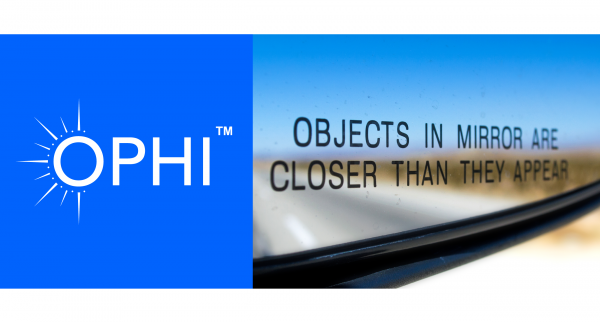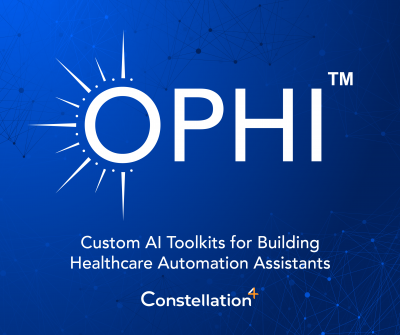Objects in the Mirror Are Closer Than They Appear | Ophi Explained

By Saru Seshadri, Founder & CEO, Jan. 2024

By Saru Seshadri, Founder & CEO, Jan. 2024
Navigating the Promise and Perils of AI in Healthcare
A recent podcast featuring Sam Altman, founder of OpenAI, suggested that Generative AI holds significant promise for several industries, including healthcare automation. The introduction of Artificial Intelligence (AI) into healthcare could be transformative. We’ve been working with Generative AI and have recently conducted a soft launch of Ophi™, a suite of our innovative capabilities, on an experimental basis. Inspired by the podcast, we’re excited to share our insights.

A Double-Edge Scalpel: AI’s Rise in Medicine
AI, much like the warning etched onto a vehicle’s side-view mirror, serves as a prescient reminder that, as we accelerate towards a horizon brimming with potential, we must navigate with caution, for the challenges and risks are closer and more immediate than they might appear in our forward charge.
Our work with Ophi™ aims to revolutionize the conventional landscape of healthcare. The goal is to harness AI to optimize workflows, enhance decision-making, and improve patient outcomes. However, the path to integrating AI, including technologies like ChatGPT or custom applications built on the OpenAI API, has been strewn with obstacles. The platform has demonstrated unpredictable behaviors even in simple healthcare situations, highlighting the current limitations of AI in critical decision-making roles. Despite its groundbreaking capabilities in natural language processing, the technology has struggled with the intricacies of medical data. Its dependence on extensive datasets can introduce biases, and its opaque nature can conceal the reasoning behind its decisions. These issues are not solely technical; they have significant ethical implications for patient care and the accuracy of treatments.
I also want to reflect on our experience around November 2023, amidst the turmoil between Sam Altman and the OpenAI board. During that period, the platform’s erratic behavior led to considerable uncertainty. Functions that operated smoothly one moment failed the next, which I suspect was possibly due to attempts to change the platform’s behavior. This experience has led us to build strategies around our reliance on this technology. Consequently, I offer the following advice to those contemplating the integration of AI in healthcare solutions.
Five Key Recommendations
1.
Enhanced Data Integrity and Diversity: Prioritize collecting and incorporating diverse, high-quality data sets. Accurate and larger datasets will mitigate biases and improve the accuracy and reliability of AI predictions, particularly in diagnosing and treating diverse patient populations.
2.
Transparent AI Algorithms: Develop AI systems with transparent, understandable algorithms. Transparency will allow healthcare professionals to comprehend and trust AI-driven recommendations, fostering a collaborative rather than a dependent relationship with AI.
3.
Ethical AI Governance: Establish robust ethical guidelines and governance structures for AI in healthcare. With much of the current population disenchanted with the healthcare industry, establishing ethical governance upfront will ensure that AI tools like Ophi are used responsibly, with patient safety and privacy as paramount considerations.
4.
Interdisciplinary Collaboration: Foster collaboration between AI technologists, healthcare professionals, and ethicists. This interdisciplinary approach can lead to more holistic AI solutions that are attuned to the real-world complexities of healthcare.
5.
Continuous Learning and Adaptation: Implement mechanisms for continuous learning and adaptation in AI systems. This approach will enable AI tools to evolve with emerging healthcare challenges and data, maintaining relevance and effectiveness.

The Future is Now!
In our quest to revolutionize healthcare with AI, the journey of Ophi reflects both the potential and the pitfalls of this technology. As we look ahead, the focus should be on creating AI tools that are not just technologically advanced but ethically sound, transparent, and patient-centric. The vision for AI in healthcare, much like the objects in a mirror, is indeed closer than it appears. Yet, it requires careful navigation to ensure that this technology enhances healthcare outcomes, establishing a harmonious balance between payers, providers, and patients. We will continue experimenting and learning with our Ophi journey, with the appropriate caveats for the users. We should remember that this is not the future of healthcare; we are actively constructing it now!
ChatGPT, personal communication assistant, January 2024

